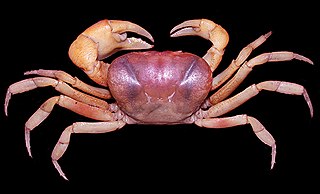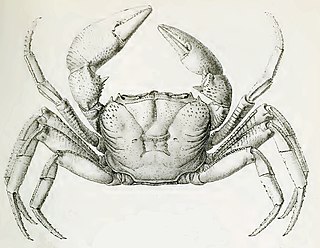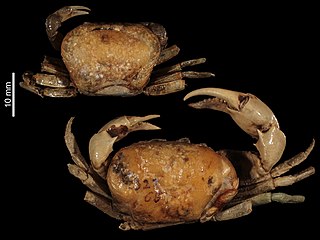
The Western Ghats, also known as the Sahyadri, is a mountain range that stretches 1,600 km (990 mi) along the western coast of the Indian peninsula. Covering an area of 160,000 km2 (62,000 sq mi), it traverses the states of Gujarat, Maharashtra, Goa, Karnataka, Kerala, and Tamil Nadu. The range forms an almost continuous chain of mountains along the western edge of the Deccan Plateau, from the Tapti River to Swamithoppe in Kanyakumari district at the southern tip of the Indian peninsula. The Western Ghats meet with the Eastern Ghats at Nilgiris before continuing south.
Ceylonthelphusa alpina is a species of freshwater crabs in the family Gecarcinucidae. The species is endemic to Sri Lanka, and is classed as an endangered due to habitat degradation.
Clinothelphusa kakoota is a species of crab in the family Gecarcinucidae, which is endemic to Sri Lanka. Its natural habitats are subtropical or tropical moist lowland forests, subtropical or tropical swamps, and rivers. It is threatened by habitat loss, and is listed as a critically endangered species on the IUCN Red List. It is known from a single site with an area of less than 100 km2 (39 sq mi). Its nearest relatives are another Sri Lankan endemic genus of crabs, Ceylonthelphusa.

Parathelphusinae is a subfamily of freshwater crabs, which was formerly placed in the family Parathelphusidae; they are mainly found in South and Southeast Asia, but also found elsewhere in Asia and in Australia. The family is now considered as a junior synonym of the family Gecarcinucidae.

The Gecarcinucidae are a family of true freshwater crabs. They are found throughout South Asia, Southeast Asia and New Guinea, with a single genus found in Australia.
The wildlife of Sri Lanka includes its flora and fauna and their natural habitats. Sri Lanka has one of the highest rates of biological endemism.

Around 1,300 species of freshwater crabs are distributed throughout the tropics and subtropics, divided among eight families. They show direct development and maternal care of a small number of offspring, in contrast to marine crabs, which release thousands of planktonic larvae. This limits the dispersal abilities of freshwater crabs, so they tend to be endemic to small areas. As a result, a large proportion are threatened with extinction.

Seychellum alluaudi is a species of freshwater crab endemic to the Seychelles, and the only true freshwater crab in that country. It lives in rainforest streams on the archipelago's granitic high islands. Although it may be abundant, little is known about its biology. If its habitat were to decline in quality, S. alluaudi might become endangered, but it is currently listed as Vulnerable on the IUCN Red List.
Oziotelphusa stricta is a species of freshwater crabs in the family Gecarcinucidae. It is endemic to Sri Lanka. The species was initially categorized as Near Threatened by the finders, but recent observations included to vulnerable by IUCN Red List due to less abundance is observed localities and much restricted ecology.

The Sri Lanka tree crab,, is a species of freshwater crabs of the family Gecarcinucidae that is endemic to Sri Lanka. It is the only known tree climbing freshwater crab found in the country. The crab is discovered from 11 localities from Sri Lanka throughout Kalu River, Walawe River and Gin River basins. Adult are known to survive well in rainwater-filled tree hollows of trees such as Shorea sp., Artocarpus sp., Dillenia sp., Garcinia sp., Myristica sp., and Gyrinops walla. Females with youngs can be seen during February and March on the ground, never within tree hollows. The known predators are Greater coucal, White-throated kingfisher, Sri Lanka grey hornbill and Eurasian otter.

Kani maranjandu is a species of tree crab first identified in 2017. K. maranjandu has, to date, only been observed in the forests of the Western Ghats in Kerala, India. As of 2021, it is the only species in the genus Kani.

Austrothelphusa transversa(von Martens, 1868), also known as the inland crab, freshwater crab, or tropical freshwater crab is a species of freshwater crab endemic to Australia. A. transversa is the most widely-dispersed species of its genus, as it has adaptations giving it a high tolerance to drought and arid conditions.
Holthuisana festiva is a species of freshwater crab in the family Gecarcinucidae. The species is endemic to New Guinea.

Ghatiana is a genus of freshwater crabs, found among the Western Ghats in India.
Ghatiana pulchra is a species of freshwater crab from the northern Western Ghats in India that was first identified in 2018.

Ghatiana dvivarna is a species of freshwater crab from the Central Western Ghats in India that was first identified in 2022.

Ghatiana atropurpurea is a species of arboreal crab from India that was first identified in 2016. Unlike other species of its genus, Ghatiana, it is not endemic to the Western Ghats.

Ghatiana splendida is a species of crab from India, first identified in 2016 in the Western Ghats. Tejas Thackeray, among the discovers of the species, has said that "locals" to where it was first described were aware of the species and would refer to it as the "purple tree crab" or the "pink forest crab". Thackeray first encountered the crab while searching for the olive forest snake.
Gubernatoriana is a genus of freshwater crabs, found among the Western Ghats in India.

Barytelphusa cunicularis is a common species of freshwater crab found in India. It is distributed throughout the country from Himachal Pradesh in north to Kerala in south except north-east india.











